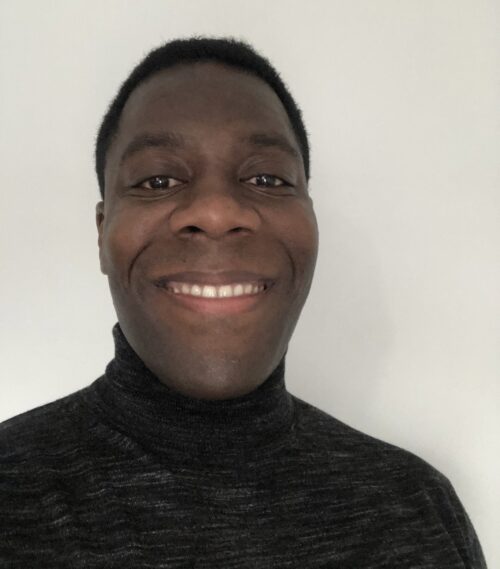
On the occasion of Black History Month UK, we speak to Joe Arday, Computer Science teacher at Woodbridge High School in Essex, UK, about his experiences in computing education, his thoughts about underrepresentation of Black students in the subject, and his ideas about what needs to be done to engage more Black students.
To start us off, can you share some of your thoughts about Black History Month as an occasion?
For me personally it’s an opportunity to celebrate our culture, but my view is it shouldn’t be a month — it should be celebrated every day. I am of Ghanaian descent, so Black History Month is an opportunity to share my culture in my school and my community. Black History Month is also an opportunity to educate yourself about what happened to the generations before you. For example, my parents lived through the Brixton riots. I was born in 1984, and I got to secondary school before I heard about the Brixton riots from a teacher. But my mother made sure that, during Black History Month, we went to a lot of extracurricular activities to learn about our culture.
For me it’s about embracing the culture I come from, being proud to be Black, and sharing that culture with the next generation, including my two kids, who are of mixed heritage. They need to know where they come from, and know their two cultures.
Tell us a bit about your own history: how did you come to computing education?
So I was a tech professional in the finance sector, and I was made redundant when the 2008 recession hit. I did a couple of consulting jobs, but I thought to myself, “I love tech, but in five years from now, do I really want to be going from job to job? There must be something else I can do.”
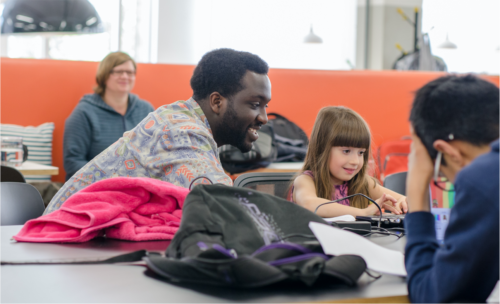
At that time there was a huge drive to recruit more teachers to teach what was called ICT back then and is now Computing. As a result, I started my career as a teacher in 2010. As a former software consultant, I had useful skills for teaching ICT. When Computing was introduced instead, I was fortunate to be at a school that could bring in external CPD (continued professional development) providers to teach us about programming and build our understanding and skills to deliver the new curriculum. I also did a lot of self-study and spoke to lots of teachers at other schools about how to teach the subject.
What barriers or support did you encounter in your teaching career? Did you have role models when you went into teaching?
Not really — I had to seek them out. In my environment, there are very few Black teachers, and I was often the only Black Computer Science teacher. A parent once said to me, “I hope you’re not planning to leave, because my son needs a role model in Computer Science.” And I understood exactly what she meant by that, but I’m not even a role model, I’m just someone who’s contributing to society the best way I can. I just want to pave the way for the next generation, including my children.
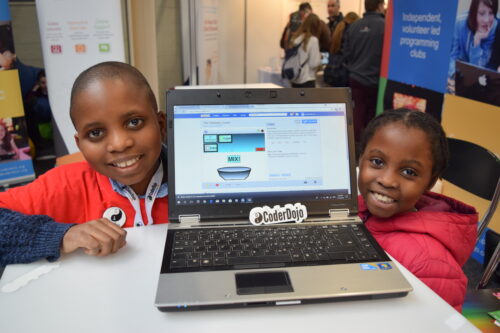
My current school is supporting me to lead all the STEM engagement for students, and in that role, some of the things I do are running a STEM club that focuses a lot on computing, and running new programmes to encourage girls into tech roles. I’ve also become a CAS Master Teacher and been part of a careers panel at Queen Mary University London about the tech sector, for hundreds of school students from across London. And I was selected by the National Centre for Computing Education as one of their facilitators in the Computer Science Accelerator CPD programme.
But there’s been a lack of leadership opportunities for me in schools. I’ve applied for middle-leadership roles and have been told my face doesn’t fit in an interview in a previous school. And I’m just as skilled and experienced as other candidates: I’ve been acting Head of Department, acting Head of Year — what more do I need to do? But I’ve not had access to middle-leadership roles. I’ve been told I’m an average teacher, but then I’ve been put onto dealing with “difficult” students if they’re Black, because a few of my previous schools have told me that I was “good at dealing with behaviour”. So that tells you about the role I was pigeonholed into.
It is very important for Black students to have role models, and to have a curriculum that reflects them.
Joe Arday
I’ve never worked for a Black Headteacher, and the proportion of Black teachers in senior leadership positions is very low, only 1%. So I am considering moving into a different area of computing education, such as edtech or academia, because in schools I don’t have the opportunities to progress because of my ethnicity.
Do you think this lack of leadership opportunities is an experience other Black teachers share?
I think it is, that’s why the number of Black teachers is so low. And as a Black student of Computer Science considering a teaching role, I would look around my school and think, if I go into teaching, where are the opportunities going to come from?
Black students are underrepresented in computing. Could you share your thoughts about why that’s the case?
There’s a lack of role models across the board: in schools, but also in tech leadership roles, CEOs and company directors. And the interest of Black students isn’t fostered early on, in Year 8, Year 9 (ages 12–14). If they don’t have a teacher who is able to take them to career fairs or to tech companies, they’re not going to get exposure, they’re not going to think, “Oh, I can see myself doing that.” So unless they have a lot of interest already, they’re not going to pick Computer Science when it comes to choosing their GCSEs, because it doesn’t look like it’s for them.
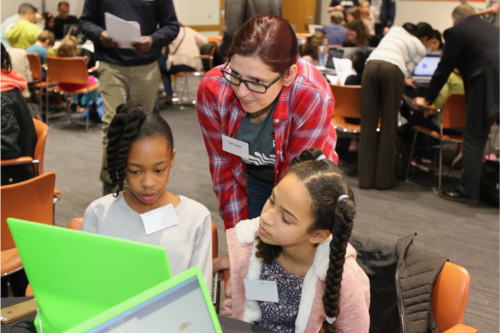
But we need diverse people in computing and STEM, especially girls. As the father of a boy and a girl of mixed heritage, that’s very important to me. Some schools I’ve worked in, they pushed computer science into the background, and it’s such a shame. They don’t have the money or the time for their teachers to do the CPD to teach it properly. And if attitudes at the top are negative, that’s going to filter down. But even if students don’t go into the tech industry, they still need digital skills to go into any number of sectors. Every young person needs them.
It is very important for Black students to have role models, and to have a curriculum that reflects them. Students need to see themselves in their lessons and not feel ignored by what is being taught. I was very fortunate to be selected for the working group for the Raspberry Pi Foundation’s culturally relevant teaching guidelines, and I’m currently running some CPD for teachers around this. I bet in the future Ofsted will look at how diverse the curriculum of schools is.
What do you think tech organisations can do in order to engage more Black students in computing?
I think tech organisations need to work with schools and offer work experience placements. When I was a student, 20 years ago, I went on a placement, and that set me on the right path. Nowadays, many students don’t do work experience, they are school leavers before they do an internship. So why do so many schools and organisations not help 14- or 15-year-olds spend a week or two doing a placement and learning some real-life skills?
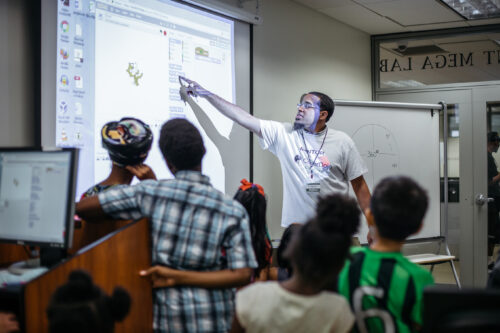
And I think it’s very important for teachers to be able to keep up to date with the latest technologies so they can support their students with what they need to know when they start their own careers, and can be convincing doing it. I encourage my GCSE Computer Science students to learn about things like cloud computing and cybersecurity, about the newest types of technologies that are being used in the tech sector now. That way they’re preparing themselves. And if I was a Headteacher, I would help my students gain professional certifications that they can use when they apply for jobs.
What is a key thing that people in computing education can do to engage more Black students?
Teachers could run a STEM or computing club with a Black History Month theme to get Black students interested — and it doesn’t have to stop at Black History Month. And you can make computing cross-curricular, so there could be a project with all teachers, where each one runs a lesson that involves a bit of coding, so that all students can see that computing really is for everyone.
What would you say to teachers to encourage them to take up Computer Science as a subject?
Because of my role working for the NCCE, I always encourage teachers to join the NCCE’s Computer Science Accelerator programme and to retrain to teach Computer Science. It’s a beautiful subject, all you need to do is give it a chance.
Thank you, Joe, for sharing your thoughts with us!
Joe was part of the group of teachers we worked with to create our practical guide on culturally relevant teaching in the computing classroom. You can download it as a free PDF now to help you think about how to reflect all your students in your lessons.
Website: LINK

